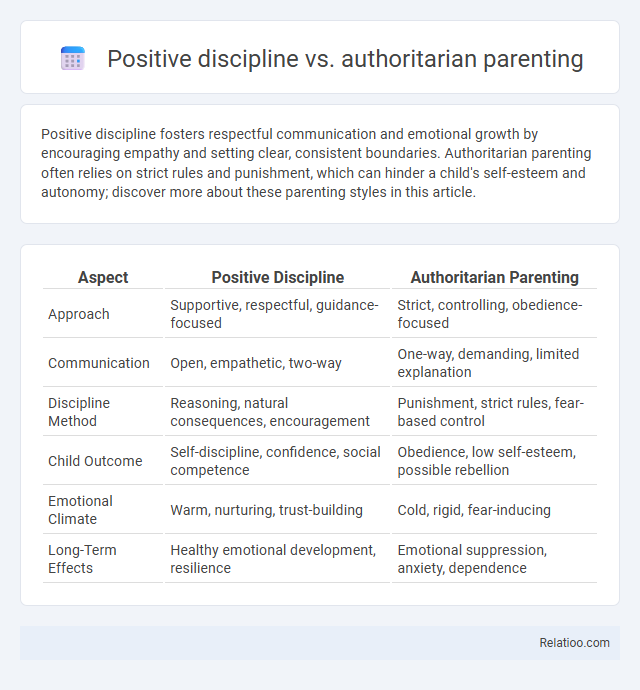Positive discipline fosters respectful communication and emotional growth by encouraging empathy and setting clear, consistent boundaries. Authoritarian parenting often relies on strict rules and punishment, which can hinder a child's self-esteem and autonomy; discover more about these parenting styles in this article.
Table of Comparison
| Aspect | Positive Discipline | Authoritarian Parenting |
|---|---|---|
| Approach | Supportive, respectful, guidance-focused | Strict, controlling, obedience-focused |
| Communication | Open, empathetic, two-way | One-way, demanding, limited explanation |
| Discipline Method | Reasoning, natural consequences, encouragement | Punishment, strict rules, fear-based control |
| Child Outcome | Self-discipline, confidence, social competence | Obedience, low self-esteem, possible rebellion |
| Emotional Climate | Warm, nurturing, trust-building | Cold, rigid, fear-inducing |
| Long-Term Effects | Healthy emotional development, resilience | Emotional suppression, anxiety, dependence |
Understanding Positive Discipline
Understanding positive discipline involves promoting respectful communication, empathy, and natural consequences to guide children's behavior, contrasting sharply with authoritarian parenting's emphasis on strict rules and punitive measures. Positive discipline fosters intrinsic motivation and emotional intelligence, encouraging cooperation rather than fear-based compliance. This approach prioritizes teaching problem-solving skills and building strong parent-child relationships, which leads to healthier psychological development and long-term behavioral success.
What is Authoritarian Parenting?
Authoritarian parenting is characterized by strict rules, high expectations, and little warmth or responsiveness, prioritizing obedience and discipline over emotional support. Unlike positive discipline, which encourages guidance and mutual respect, authoritarian parenting often relies on punishment and control to manage behavior. Research shows this style can lead to lower self-esteem and social competence in children compared to more nurturing approaches like positive discipline.
Core Principles of Positive Discipline
Positive Discipline emphasizes mutual respect, encouragement, and fostering intrinsic motivation by teaching children valuable life skills and problem-solving abilities, contrasting with Authoritarian Parenting's strict rules and punitive measures. Your approach with Positive Discipline focuses on guiding behavior through empathy, connection, and consistent, non-punitive consequences that build trust and cooperation. Core principles include understanding the child's perspective, promoting accountability instead of punishment, and reinforcing positive behavior to nurture long-term emotional intelligence and resilience.
Key Characteristics of Authoritarian Parenting
Authoritarian parenting is characterized by strict rules, high demands, and little warmth or nurturing, emphasizing obedience and discipline through punishment. Parents set clear expectations and enforce rigid control without seeking input or explaining the rationale behind rules. This style often leads to children who are obedient but may struggle with self-esteem, social skills, and independent decision-making.
Emotional Impact on Children
Positive discipline fosters emotional security by encouraging empathy and self-regulation, leading to higher self-esteem and reduced anxiety in children. In contrast, authoritarian parenting often results in fear, low self-worth, and increased aggression due to strict control and lack of emotional support. Your choice of positive discipline can promote healthier emotional development and stronger parent-child bonds.
Long-Term Behavioral Outcomes
Positive discipline promotes long-term behavioral outcomes by encouraging intrinsic motivation, empathy, and self-regulation in children, leading to improved social skills and emotional resilience. Authoritarian parenting, characterized by strict rules and punitive measures, often results in obedience but can foster anxiety, low self-esteem, and poor social competence over time. Your choice of positive discipline supports healthier psychological development and sustainable positive behaviors compared to the rigid control of authoritarian methods.
Building Respectful Parent-Child Relationships
Positive discipline emphasizes building respectful parent-child relationships through empathy, communication, and mutual respect, fostering emotional growth and self-regulation. Authoritarian parenting relies on strict rules and obedience, often leading to fear and compliance rather than understanding or internal motivation. Positive discipline creates a foundation of trust and cooperation, encouraging children to develop social skills and responsibility without harsh punishment.
Discipline Strategies Compared
Positive discipline emphasizes respectful communication, fostering self-regulation and intrinsic motivation, while authoritarian parenting relies on strict rules, punishment, and obedience without explanation. Your discipline strategies can impact a child's emotional development, with positive discipline promoting empathy and problem-solving skills, compared to authoritarian methods that may lead to fear or rebellion. Research shows that positive discipline encourages long-term behavioral improvement by guiding children rather than controlling them through fear or punishment.
Encouraging Independence vs. Obedience
Positive discipline emphasizes fostering children's independence by encouraging problem-solving and self-regulation, promoting internal motivation rather than mere compliance. Authoritarian parenting prioritizes obedience through strict rules and punishments, often suppressing autonomy in favor of control. Positive discipline techniques support developing responsible decision-making skills, balancing guidance with respect for the child's individuality and growth.
Choosing the Right Approach for Your Family
Choosing the right parenting approach depends on understanding the benefits and limitations of each style: positive discipline encourages respectful communication and emotional growth by setting clear boundaries without punishment, while authoritarian parenting relies on strict rules and obedience often at the expense of a child's autonomy and emotional development. Research shows that positive discipline promotes long-term social competence and self-regulation in children, whereas authoritarian methods may increase compliance but also risk higher levels of anxiety and lower self-esteem. Tailoring your parenting strategy to your family's unique values and your child's temperament ensures healthier relationships and fosters a supportive home environment.

Infographic: Positive discipline vs Authoritarian parenting
 relatioo.com
relatioo.com